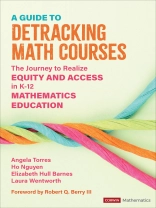Create a pathway to equity by detracking mathematics
The tracked mathematics system has been operating in US schools for decades. However, research demonstrates negative effects on subgroups of students by keeping them in a single math track, thereby denying them access to rigorous coursework needed for college and career readiness. The journey to change this involves confronting some long-standing beliefs and structures in education.
When supported with the right structures, instructional shifts, coalition building, and educator training and support, the detracking of mathematics courses can be a primary pathway to equity. The ultimate goal is to increase more students’ access to and achievement in higher levels of mathematics learning–especially for students who are historically marginalized. Based on the stories and lessons learned from the San Francisco Unified School District educators who have talked the talk and walked the walk, this book provides a model for all those involved in taking on detracking efforts from policymakers and school administrators, to math coaches and teachers.
By sharing stories of real-world examples, lessons learned, and prompts to provoke discussion about your own context, the book walks you through:
- Designing and gaining support for a policy of detracked math courses
- Implementing the policy through practical shifts in scheduling, curriculum, professional development, and coaching
- Supporting and improving the policy through continuous research, monitoring, and maintenance.
This book offers the big ideas that help you in your own unique journey to advance equity in your school or district’s mathematics education and also provides practical information to help students in a detracked system thrive.
Inhoudsopgave
Foreword
Chapter 1: Your Guidebook to Detracking Math
Part 1: Developing a Policy for Detracked Math Courses
Chapter 2: Getting to Know Your Policy Context
Chapter 3: Designing a Detracked Math Course Policy
Chapter 4: Gaining Support for a Detracked Math Course Policy
Part 2: Implementing a Policy of Detracked Math Courses
Chapter 5: Math Curriculum to Support Heterogeneous Classrooms
Chapter 6: Professional Development to Support Heterogeneous Classrooms
Chapter 7: Coaching Teachers to Support Heterogeneous Classrooms
Part 3: Maintaining Detracked Math Course Practice
Chapter 8: Crafting School Schedules That Support Heterogeneous Classrooms
Chapter 9: Considering Research Throughout Your Math Detracking Journey
Chapter 10: Monitoring and Maintaining a Detracked Math Policy
Over de auteur
Laura Wentworth, Ph D, is the Director of Research Practice Partnerships at California Education Partners. For over a decade, Laura has worked to unite research, policy and practice by directing the Stanford University and San Francisco Unified School District partnership. She supported the development of the Stanford-Sequoia K-12 Research Collaborative and the Oakland Unified School District and UC Berkeley Partnership. She is also a Lecturer at Stanford University in two courses – Introduction to Research-Practice Partnerships and Advanced Partnership Research. Wentworth has served on the founding steering committee for the National Network of Education Research Practice Partnerships (NNERPP), and in 2020 received the Alumni Excellence in Education Early Career Award from Stanford University Graduate School of Education. In partnership with NNERPP members. Laura led the development and spread of the concept of brokering across RPPs by publishing the RPP Brokers Handbook. She has a Masters in instruction and curriculum from the University of Colorado, a Masters in the social sciences of education and a Ph D in administration and policy analysis in education from Stanford University Graduate School of Education. Wentworth has articles and chapters published in and by Phi Delta Kappan, Teachers College Record, Educational Research, Stanford Social Innovation Review, Jossey Bass, Teachers College Press and Educational Policy.












